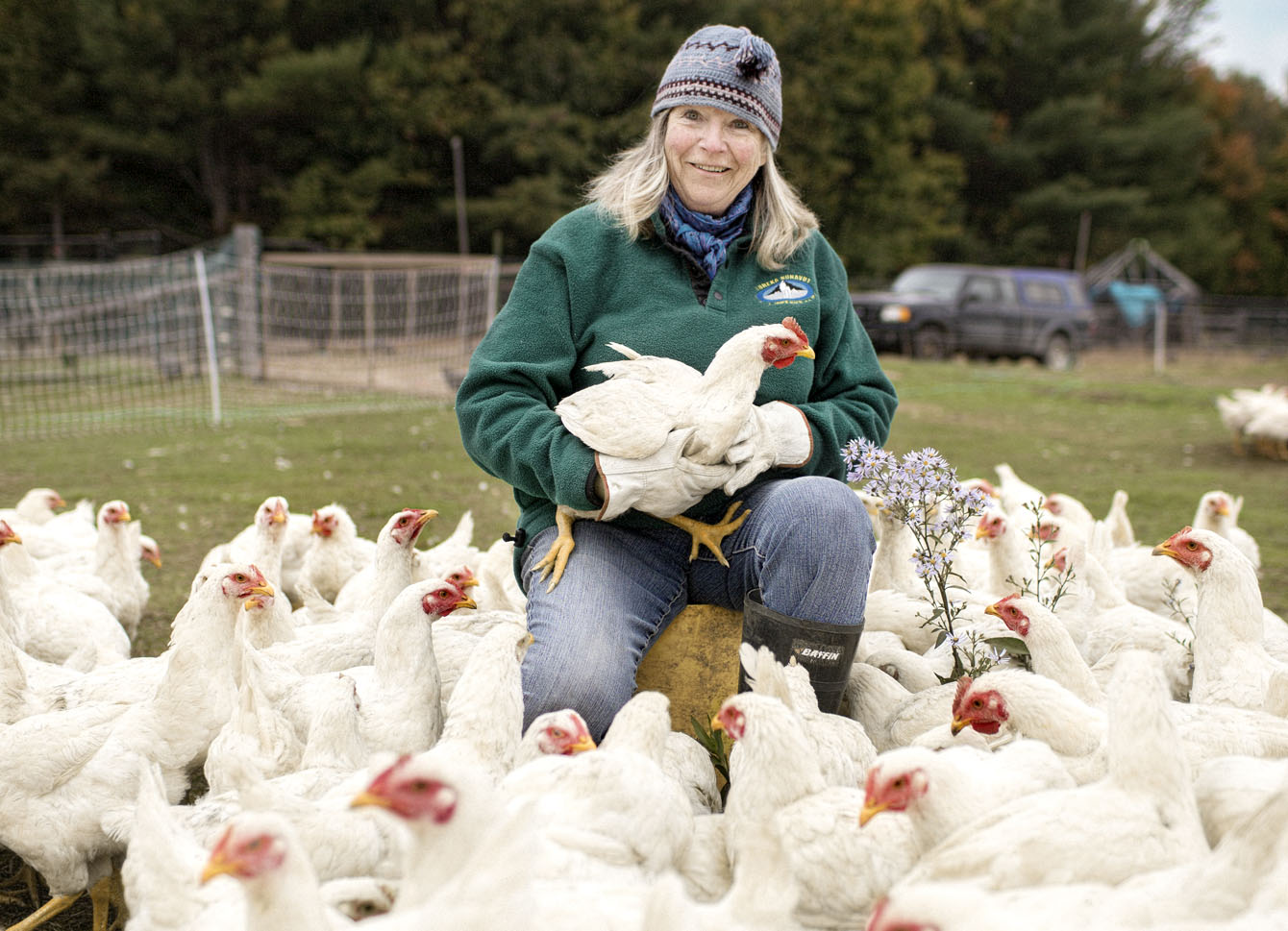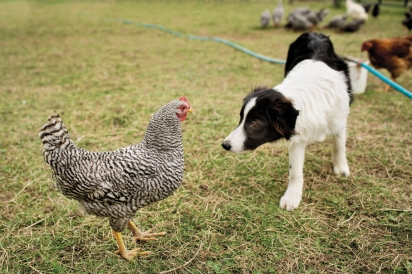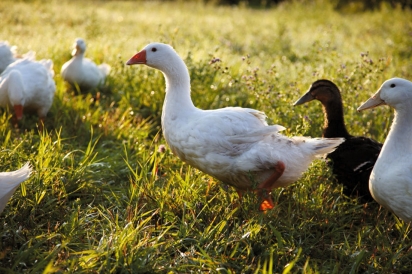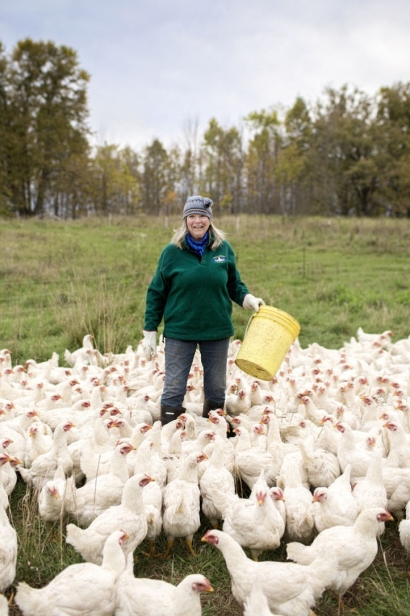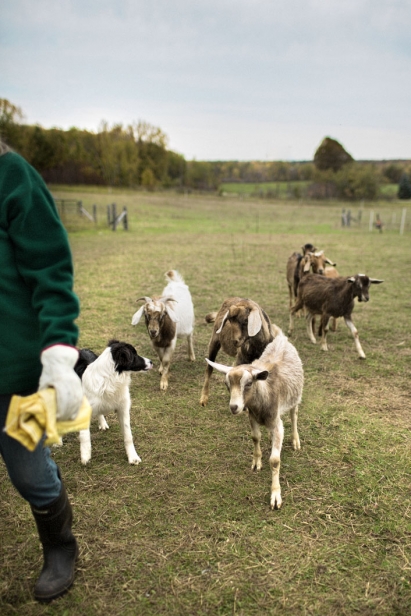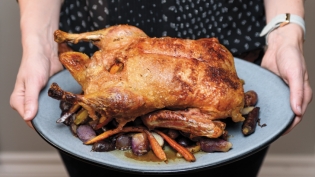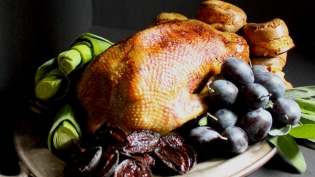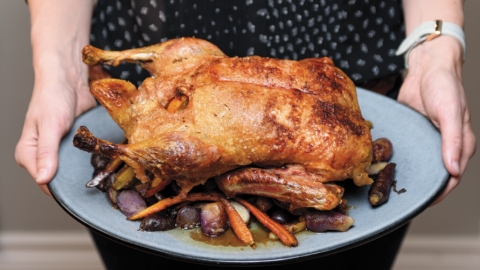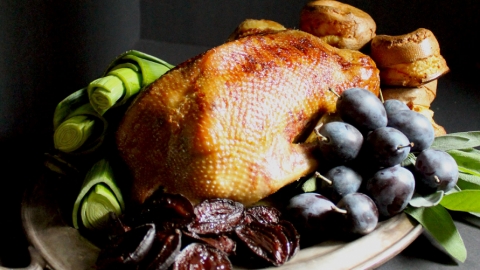A Fowl Christmas
One might wonder if a little bit of Hans Christian Andersen runs in the veins of Dorothy Edwards. Andersen, the famous Danish writer of fairy tales, once said, “Just living is not enough. One must have sunshine, freedom and a little flower.”
Edwards brings the same formula to her husbandry of ducks, geese, chickens and turkeys on her farm, Dorothy’s Ducks, in Renfrew County.
Indeed, she says, these birds need sunshine and freedom — and if flowers are not top of their wish list, they do need exposure to natural green grass. “The birds need to live,” Edwards says. “I love raising free-range birds and animals — no interest in confining them at all.”
For at least 12 hours per day, her birds have free range over 10 acres of pasture-managed fields. At night, she keeps them in a secure yard and secure buildings. On hot days, they can retreat to the woods for shade.
It’s crucial to follow good pasture management practices, Edwards says. That means keeping the birds on green pasture all the time — and that means moving them, every two or three days, from one green patch of pasture to another. “Leave them on one patch too long and they’ll eat things down so far that there’s not a blade of grass in sight — and when that happens, it takes ages for the grass to recover.”
They eat only organic feed from Homestead Organics, headquartered in Berwick, Ont.
Pretty cushy for the birds? Well, they seem happy enough, Edwards says. “They’re fascinating to watch. They’re always busy, scratching the ground, constantly moving, making wonderful sounds. I can get mesmerized as I watch them.”
One might wonder if this care and concern comes from a mystical sense of the unity of all life, but Edwards doesn’t want to go there. “‘Mystical’? I don’t know. I’d rather say I want to respect these animals — which, remember, I’m going to have to kill — and I want to give them the best life I can while they’re here.”
Beyond that, she believes her approach produces meat of higher quality than more commercial approaches permit.
This year, she raised 60 chickens, 50 turkeys, 30 geese, and 120 ducks. (She also raises small numbers of goats and lamb.)
She’s currently looking, so far unsuccessfully, for a truly tasty chicken breed. “I’ve often had the classic White Rock chicken and it grows quickly and makes a nice, chubby little carcass — but there’s no flavour, nothing like the chickens my grandmother used to raise.”
The chicken industry is indifferent to flavour, she believes. “They want something that grows quickly and can be cheaply brought to market anywhere. But there’s no emphasis on taste.”
She had two types of ducks this year, the Muscovy duck, native to the tropical Americas, but nicely adaptable to cooler climates, and the Pekin, originally from China, but now raised everywhere. Of the two, the Muscovy duck is the gamier in flavour though both are milder than wild duck.
As the holiday season approaches, Edwards naturally hopes to sell some turkeys to Christmas shoppers. Of course, she would be just as happy to sell a goose or two, which for centuries was the default choice for Christmas dinner, especially in Britain and in Europe. “But I haven’t seen too much movement to goose,” she says, “except for European people for whom they’re traditional.”
Turkey was the Christmas dinner staple of her childhood, but Edwards is effusive about the merits of goose, which is moister and has more taste than turkey.
For 2017’s Thanksgiving dinner, usually dominated by turkey, she took barbecued duck and goose to her son Robin Turner’s organic vegetable farm (featured on page 16), near Wakefield. Those birds, “really tender and flavourful,” could have won many converts.
It’s not easy to make money doing what Edwards is doing. The organic chicken feed, for example, costs two to three times more than regular feed. And allowing birds to range freely contradicts the practice of industrial poultry farming, which may provide ready profits, but, unthinkably for Edwards, treats birds with assembly-line cruelty.
Edwards has always done things her own way. A licenced cook, she owned a restaurant for 10 years and later added ownership of a yacht club to her portfolio. Twenty-three years ago, she dropped everything to spend two decades in the high Arctic cooking at various National Defence installations, including a stint in Alert, on Ellesmere Island, the most northerly permanently inhabited place in the world, roughly 800 kilometres from the North Pole, followed by service as a supervisor chef at an iron mine on Baffin Island.
In 2013, back in Ontario, she began her current vocation of farming poultry. Her birds are available at the Ottawa Valley Food Co-op, the Ottawa Christmas farmers’ markets in Carp and at Lansdowne. Edwards is semi-retired now. Her life centres mostly on the farm.
“I’m lucky to have a beautiful property and I want to be on it, retired, but earning some money from the land,” she says. “In terms of size, the birds are manageable for me. There’s no heavy work involved and they’re pretty amusing all the time.”
She’s having fun and, one guesses, so are the birds.
Dorothy's Ducks, My Favourite Farm
73 Schoolhouse Road, Pembroke, Ont.
myfavouritefarm.com, 613.735.5549


